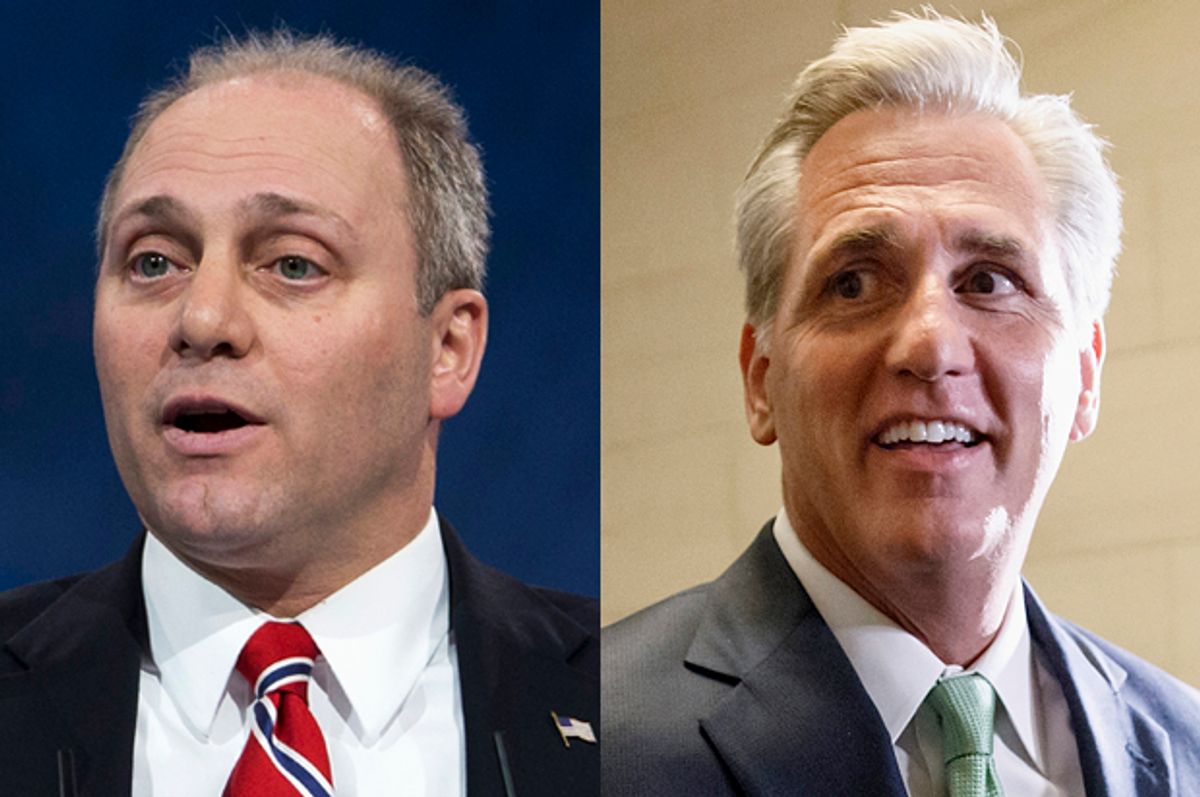My seventh-grade class president election was rife with controversy. During lunchtime on the day of, one of the two candidates was passing out Sweet Tarts to woo prospective voters. Her challenger labeled this "extortion." Well, it was bribery. And those Sweet Tarts were good enough for my vote! The challenger tried his best to win the sympathy vote, by crying and reading a poem during his speech, but it wasn't enough. Sweet Tarts won the day.
Which brings us to the closest approximation we have in adult world of a middle-school class election: yesterday's GOP leadership election in the House, held a mere nine days after Majority Leader Eric Cantor's primary defeat. Rep. Kevin McCarthy easily won the majority leader post, despite being a dirty California RINO. McCarthy may be a touch to the left of most of his conservative stalwart colleagues, but he'd already won so many of their hearts by playing Cool Older Brother over the past few years.
Taking McCarthy's old job as majority whip will be Rep. Steve Scalise, the head of the Republican Study Committee. While handicappers were expecting the whip race to go multiple ballots, Scalise wrapped it up in the first round against challengers Marlin Stutzman and Pete Roskam. How did Scalise work his magic? It wasn't with Sweet Tarts. It was with other sugary treats, notes, flowers, T-shirts and fancy collector's edition baseball bats, according to Politico's tick-tock of the election.
Steve Scalise is known for giving his friends a little bit extra. In Louisiana, it’s called lagniappe.
Anytime anyone did a favor for the Louisiana Republican — whether they made a call for him, or spoke up on behalf of a bill he favored — they would find themselves on the receiving end of lagniappe (LAN-yap), or a small unexpected gift. Sometimes it was a praline — Scalise has a basket of them sitting, wrapped in plastic, on a coffee table next to the couch in his office in the Rayburn House Office Building. Other times it was a personalized note, T-shirt or flowers. On Wednesday night, the lawmakers who helped put him in a position to become the next House majority whip got an engraved red baseball bat.
"Lagniappe," bribes, tchotchkes, gifts, presents -- whatever you call them, that's a fine collection of swag there! Sure, this guy can be the whip, just keep the goods coming.
But then there are the more serious arts of persuasion at which Scalise also appears to have been a master. "The Louisianan promised to look out for the interests of individual states, lawmakers and regions when it comes time to divvy up committee assignments," Politico writes. "He simply knew what everyone wanted."
This is just the way things work and have worked for hundreds of years. Someone wants the support of fellow members and offers up plum committee assignments, through which members can better steer resources to their districts. You don't give your vote to someone for nothing; if you do, you're probably not representing the interests of your district to the best of your ability. There's nothing especially scandalous about this.
But the way in which the House leadership was won still doesn't fit with the tenor of the big Tea Party primaries we've been following, including the one that led to this leadership shakeup in the first place. Much of David Brat's victory against Cantor in VA-07 was credited to the power of Brat's conservative ideas against the business-as-usual complacency of Cantor. And in Mississippi, Tea Party challenger Chris McDaniel is poised to upset Sen. Thad Cochran by running a campaign against Washingtonism and its old model of distributing favors for support. If the leadership election were to resemble Tea Party ideals, each candidate would have attempted to win support simply by giving a rousing speech backed by the power of ideas and nothing else. No pre-meetings or favor-trading would have taken place beforehand.
That's why the leadership elections have got to be disappointing for Tea Party activists. They can take out "Establishment" incumbents in primaries here and there. But inside the conference, popularity still comes down to Sweet Tarts.

Shares